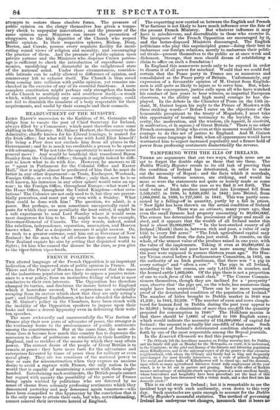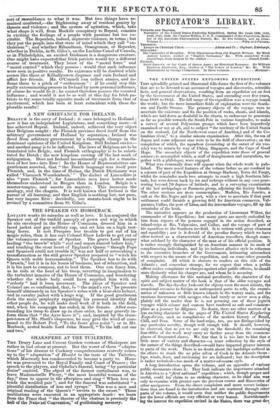TAMPERING WITH THE ILLS OF IRELAND.
THERE are arguments that cut two ways, though none are so apt to forget the double edge as those that use them. The Dublin Weekly Register recurs to its old task of proving that the condition of Ireland has deteriorated, in order to make out the necessity of Repeal : and the facts which it marshals, selected from various sources, are striking, and would be more so were the statements not quite so loosely made as some of them are. We take the case as we find it set forth. The total value of Irish produce imported into Liverpool fell from 5,559,0471. in 1838, to 3,649,4281. in 1842 ; into Bristol, from 1,088,6801. in 1839, to 727,5601. in 1842. This was partly occa- • smiled by a falling-off in quantity, partly by a fall in prices. " New light has been thrown on the actual condition of Ireland in another way. There was an estimate, many years ago, that even the small farmers had property amounting to 30,000,0001. The census has determined the possessions of large and small in stock, and it appears that the wealth of all Ireland under this head is about 20,000,000/2' " In the best-stocked county of all Ireland [Meath] there is, between rich and poor, a value of only 155/. to every 100 acres." "The Irish agricultural capital may safely be inferred from the data just stated. It consists, on the whole, of the utmost value of the produce raised in one year, with the value of the implements. Taking it even at 30,000,000/. is supposing that rich and poor have not more among them than the poor were supposed to possess thirteen years ago." Sir Hus- sey Vivian stated before a Parliamentary Committee, in 1832, on the authority of an Irish gentleman, that there was " a pig in every cottage" and " often a cow." " The pigs in all Ireland, according to the last census, are only 1,412,000 in number, and the horned cattle 1,863,000. Of the pigs there is not a proportion of one to each farm of the small class." " The Census Commis- sioners themselves, though they are inclined for a ' prosperity' case, observe that' the pigs are, on the whole, less numerous than might have been expected.' There can be no more unerring proof of the deteriorated condition of the population of Ireland.' The number of hides brought to Dublin market in 1840 was 41,226 ; in 1844, 32,928. " The number of oxen and cows slaugh- tered for human food in Dublin during the past year appear to be 32,982 ; being a diminution of more than one;-fiftli the quantity prepared for consumption in 1840." The Holkham maxim is that there should be 1,0001. of capital to 100 English acres ; which would indicate the necessity of 134,000,000/. of capital for Ireland : the amount is actually but one-fifth of that sum. Such is the account of Ireland's deteriorated condition elaborately set forth by one of the most respectable among the Repeal journals.
In the Limerick Chronicle we find this paragraph-
" The O'Grady left the hereditary mansion on Friday morning last, for Dublin; and his family will quit on Monday for the Metropolis, en route, it is understood, to the Continent; to the grief and dismay of the farmers and labouring population about Irdballyowen, and to the universal regret of all the gentry in that extensive neighbourhood, with whom the O'Grady and family had so long and frequently interchanged the most friendly intercourse, on a scale of princely hospitality. The social and festive halls of Kilballyowen will be closed up; and the demesne, upon which so many agricultural labourers found daily employment all the year round, is to be let out in pasture and grazing. Such is the effect of Rockite menace and outrage of midnight attack u the peace of a most excellent family, whose benevolence and hospitality have n proverbial: yet the head of this ancient house has been threatened with a violent death, and a shot fired into his domestic circle !"
This is an old story in Ireland ; but it is remarkable to see the incident kept up with such uniformity, even down to this very day. Such spectacles are quite enough to account for the Dublin Weekly Register's mournful statistics. The method of governing Ireland has undergone vast changes, insomuch that it bears no Sort of resemblance to what it was. But two things have re- mained unaltered,—the frightening away of resident gentry by threats and violence ; and the system of agitation, which, take what shape it will, from Rockite conspiracy to Repeal, consists in exciting the feelings indeed, a people with passions but too ex- citable. The Repealers, mdeed, deprecate violence, in terms ; but they put the people into that state of mind which they call "en- thusiasm" ; and whether Ribandman, Orangeman, or Repealer, whether in Dublin, in St. Giles's, on the Lachine Canal of Canada, or in Philadelphia, an excited Irishman is a dangerous creature. One might have expected that Irish patriots would try a different course of treatment. They boast of the "moral force" and "moral control" which they possess : would that such influence were seen in positive results. Its existence will be doubted while scenes like those at Kilballyowen disgrace and ruin Ireland and afflict her friends. Mr. O'Connell can collect armies, and in- flame them to a pitch of " enthusiasm " : if he could stop this really exterminating, process in Ireland by mere personal influence, of course he would do it : he cannot therefore possess the vaunted influence; would it not be as well at this day for Irish pa- triots to try some totally opposite mode of treatment from that of excitement, which has been at least coincident with these de- plorable results?



























 Previous page
Previous page